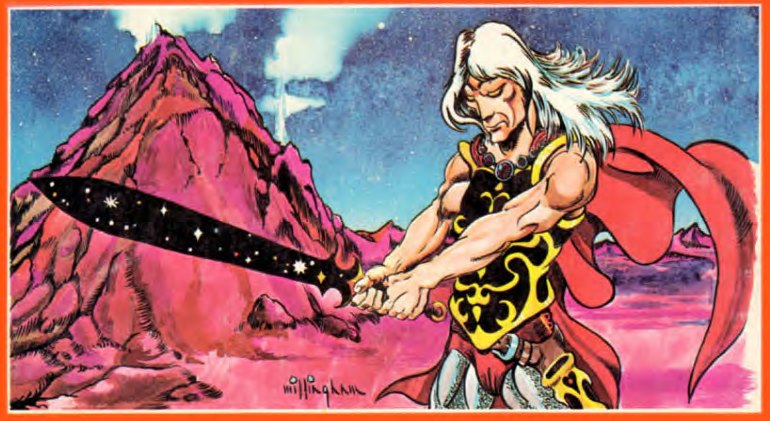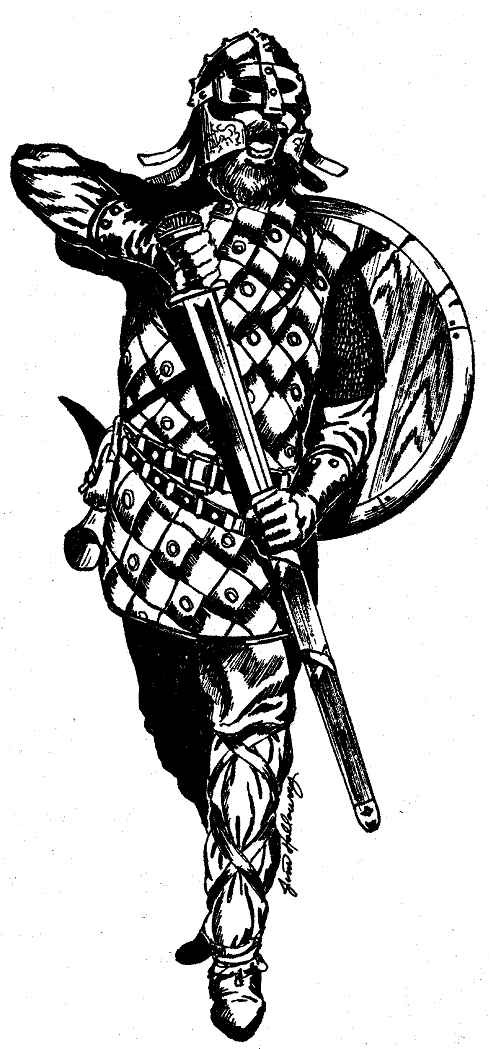

| Dragon | - | Magic Items | - | Dragon 46 |
One of the major desires of every Fighter is to come into possession
of a magic
sword. Powerful swords not only increase a
character’s fighting ability, but can also provide protection from
certain spells, give information on the whereabouts of treasure,
illuminate dark dungeon corridors, and perform other such useful services.
Enchanted
blades play an important part in fantasy
role-playing and are also commonplace in
modern heroic fantasy literature.
However, most players do not realize
that magic swords trace their sources back
to many bygone eras and civilizations
which had heroic literary traditions.
In ancient times, arms and armor were prized
possessions; they were revered, given
names and special characteristics. From
Achilles’ god-made armor and the arrows of
Herakles, to Thor’s Uru hammer, both gods
and heroes had special weapons. Most
people are acquainted with the classical
heroic epics like The Iliad and The Aeneid,
but many are less familiar with the later
European epics, such as Beowulf and Das
Nibelungenlied, in which swords such as
those found in fantasy gaming are best represented.
Beowulf is the earliest extant poem in a
modern European language. It recounts
the adventures of the Geatish hero
Beowulf, from his young warrior days, until
his death at the fangs of a dragon. There
are many fantasy-gaming motifs in the
Anglo-Saxon epic, including monsters, dragon hoards, and magic.
Beowulf is
a mighty hero; when not yet age 20, he manages to
outwrestle the monster Grendel, and rips
off the monster’s arm in the process. Mighty
as he is, though, Beowulf cannot perform
many of his great deeds without the help of
three swords, Naegling, Hrunting, and an
unnamed magic blade. Because Unferth, a
great warrior, doubts that Beowulf’s own
sword, Naegling, will be enough to kill
Grendel’s mother, Unferth lends Beowulf
his own renowned blade, Hrunting.
As good as these two swords are,
Grendel’s mother, like Grendel himself, has
skin impervious to normal steel, and without
the help of still another sword, Beowulf
would have died. This unnamed weapon
was a sword made by giants, and blessed
with giants’ magic, with runes and carved
decorations on its hilt. It was so massive
that no normal man could lift it. Beowulf not
only lifted the sword and killed Grendel’s
mother, but cut off Grendel’s head as well,
before the blade melted from exposure to
the acid blood of these monsters. Without
the help of this magic giants’ sword, one of
the greatest heroes of epic literature would
have died an untimely death.
Cuchulain of Muirthemne is the greatest
hero of Ireland, and his many legends are
heroic masterpieces. Called the Irish Achilles,
Cuchulain, the Hound of Ireland, was
the nephew of King Conor of Ulster, and
was said to be the son of the great god Lugh
of the Long Hand. By the time he was 17,
Cuchulain was without peer among the
champions of Ulster. Like Beowulf,
Cuchutain also had personal arms: his shield,
Dubhan, and his great bronze sword,
Cruaidin Calcidheann, the hard-headed
one. Cuchulain used this sword to great
avail until the day of his death at the hands
of his bitter enemies, who finally managed
to kill this great hero through the treacherous use of an enchanted
spear.
The Germanic Nibelungenlied also
contains many typical fantasy motifs, such
as dwarves, dragons, and magic cloaks.
Based on an earlier oral legend, this epic is
perhaps the best example of heroic literature from the Christian era.
The 12th-century Scandinavian Edda, Brot, tells of
Siguro’s gold-bedizened sword Gram,
which had fire-tempered edges, and was
bated inside with venom. From this source,
and many others, an unknown, early 13th century Austrian poet
created Das Nibelungenlied, which tells of the death of Siegfried
(Siguro), and his wife Kriemhild’s revenge.
In this epic, Siegfried’s sword Balmung
has interesting characteristics which
should be familiar to fantasy-gaming enthusiasts. Although Balmung
is an excellent
blade which strikes fear into the hearts of all
who face it, from the context of the story it is
obvious that Balmung is cursed.
At the beginning of Das Nibelungenlied,
Balmung is in the possession of Prince
Nibelung, whom Siegfried kills, afterward
stealing his weapon. Then Hagen murders
Siegfried and takes Balmung for himself.
After wreaking havoc on her brother’s and
second husband’s warriors, Kriemhild,
Siegfried’s widow, finally reclaims her late
husband’s sword and uses it to kill Hagen,
Siegried’s murderer. Finally, Kriemhild is
then murdered by Hildebrand. So every
owner of Balmung in Das Nibelunglied is
killed, and two, Prince Nibelung and Hagen,
are killed by Balmung itself. Woe be it to the
unfortunate player who comes into possession
of a sword with such a dangerous curse.
Other fine examples of fantasy-gaming
motifs in ancient literature can be found in
the legends of Charlemagne. The French
Chanson de Roland and the Italian Orlando
Furioso tell of Charlemagne’s 12 Paladins,
the most famous of whom are Orlando
(Roland), Rinaldo, and Ogier the Dane.
Readers of Tolkien would recognize many
familiar elements in these ancient stories,
among them dwarves, orcs, dragons,
magic potions, sorcerers, and magic rings
which turn their wearers invisible. Magic
swords play an important role in these stories,
and the most famous of these is Orlando’s sword, Durindana (Durendal),
which is
said to be the blade used by Hector of Troy.
Orlando won Durindana in a battle with a
Saracen warrior, and discovered this blade
to be so powerful that no armor could stand
against it. Durindana had so much magical
power that it was said it could cleave the
Pyrenees with one blow. When he was dy
ing, Orlando tried to break Durindana to
prevent it from falling into enemy hands, but
he merely succeeded in splitting a boulder,
leaving the magic sword unmarred.
Orlando had another magical sword,
called Balisarda, which was fashioned by
the enchantress Falerina so that no spells
could avail against it. Balisarda could cut
through even enchanted substances, and
had such magical power that it could clear a
path through a body of water. The other
heroes of these legends also had great
swords, including Rinaldo’s Fusberta,
Rogero’s Belisarda (which was enchanted
to cleave through armor) and Charlemagne’s own Joyeuse.
Ogier the Dane also had an enchanted
blade which rivaled Durindana for power.
Blessed by faeries at birth, Ogier became a
great warrior, and when he achieved
knighthood, the faerie Morgana, ruler of the
Isle of Avalon, gave Ogier a sword which
had written on it that it was called Cortana,
and was of the same temper and steel as
Joyeuse and Durindana. In the hands of
Ogier, Cortana fell on no one without inflicting a mortal wound.
Ogier and Cortana were taken by Morgana to Avalon, where, in
the company of another great hero, they
await the day they are again needed.
This other hero is of course Arthur, King
of Britain and rightful master of perhaps the
most famous of all swords, Excalibur. In his
Historia Regum Britanniae, Geoffrey of
Monmouth tells of Arthur and his great
sword Caliburn, which, through
the centuries (and the tellings of many writers) finally
became, in the writing of Sir Thomas
Malory, the great sword Excalibur,
the symbol of Arthur’s divine right to kingship.
Excalibur first came into Arthur’s grasp
when he pulled it from the stone and proved
himself to be the son of Uther Pendragon.
Later, after a fierce battle, Arthur once
again comes into possession of Excalibur,
this time from the Lady of the Lake. After
killing Modred and receiving his own death
wound, Arthur, like Orlando, is more
concerned about his sword than anything else.
He commands that it be thrown into the
lake-and when his orders are finally
obeyed, a hand rises out of the lake to grasp
the great sword. The legends say that both
Arthur and Excalibur repose on the Isle of
Avalon, awaiting the day when England
needs them once more.
The ancient heroic epics contain excellent source material for literary-minded
players and DM’s. Although Excalibur and Cortana are unavailable, who
knows what
happened to Hrunting, Cruaidin Calcidheann, Balisarda, or Fusberta?
Some legends say that Durindana was used by another great French hero,
Joan of Arc, but
who knows where it went from there? Perhaps some lucky character will
wield Naegling anew—or if unlucky, be cursed by Balmung, and not live to
see another battle.
<make links to to the full text versions of the named works>
<make links to the wikipedia articles>
